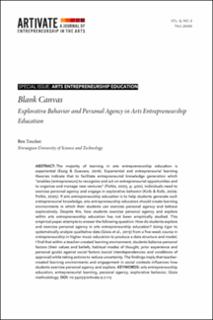| dc.contributor.author | Toscher, Benjamin | |
| dc.date.accessioned | 2020-10-22T11:36:08Z | |
| dc.date.available | 2020-10-22T11:36:08Z | |
| dc.date.created | 2020-10-06T17:51:58Z | |
| dc.date.issued | 2020 | |
| dc.identifier.citation | Artivate: A Journal of Entrepreneurship in the Arts. 2020, 9 (2), 19-44. | en_US |
| dc.identifier.issn | 2164-7747 | |
| dc.identifier.uri | https://hdl.handle.net/11250/2684484 | |
| dc.description.abstract | The majority of learning in arts entrepreneurship education is experiential (Essig & Guevara, 2016). Experiential and entrepreneurial learning theories indicate that to facilitate entrepreneurial knowledge generation which “enables [entrepreneurs] to recognize and act on entrepreneurial opportunities and to organize and manage new ventures” (Politis, 2005, p. 400), individuals need to exercise personal agency and engage in explorative behavior (Kolb & Kolb, 2009; Politis, 2005). If arts entrepreneurship education is to help students generate such entrepreneurial knowledge, arts entrepreneurship educators should create learning environments in which their students can exercise personal agency and behave exploratively. Despite this, how students exercise personal agency and explore within arts entrepreneurship education has not been empirically studied. This empirical paper attempts to answer the following question: How do students explore and exercise personal agency in arts entrepreneurship education? Using rigor to systematically analyze qualitative data (Gioia et al., 2013) from a five-week course in entrepreneurship in higher music education to produce a data structure and model, I find that within a teacher-created learning environment, students balance personal factors (their values and beliefs, habitual modes of thought, prior experience and personal goals) against social factors (social interdependencies and conditions of approval) while taking actions to reduce uncertainty. The findings imply that teacher-created learning environments and engagement in social contexts influences how students exercise personal agency and explore. | en_US |
| dc.language.iso | eng | en_US |
| dc.publisher | Pave Program in Arts Entrepreneurship, Arizona State University | en_US |
| dc.relation.uri | https://artivate.org/artivate/article/view/115 | |
| dc.rights | Attribution-NonCommercial-NoDerivatives 4.0 Internasjonal | * |
| dc.rights.uri | http://creativecommons.org/licenses/by-nc-nd/4.0/deed.no | * |
| dc.title | Blank Canvas: Explorative Behavior and Personal Agency in Arts Entrepreneurship Education | en_US |
| dc.type | Peer reviewed | en_US |
| dc.type | Journal article | en_US |
| dc.description.version | publishedVersion | en_US |
| dc.source.pagenumber | 19-44 | en_US |
| dc.source.volume | 9 | en_US |
| dc.source.journal | Artivate: A Journal of Entrepreneurship in the Arts | en_US |
| dc.source.issue | 2 | en_US |
| dc.identifier.doi | 10.34053/artivate.9.2.115 | |
| dc.identifier.cristin | 1837713 | |
| dc.description.localcode | Copyright (c) 2020 Ben Toscher Creative Commons License This work is licensed under a Creative Commons Attribution-NonCommercial-NoDerivatives 4.0 International License. | en_US |
| cristin.ispublished | true | |
| cristin.fulltext | original | |
| cristin.qualitycode | 1 | |

